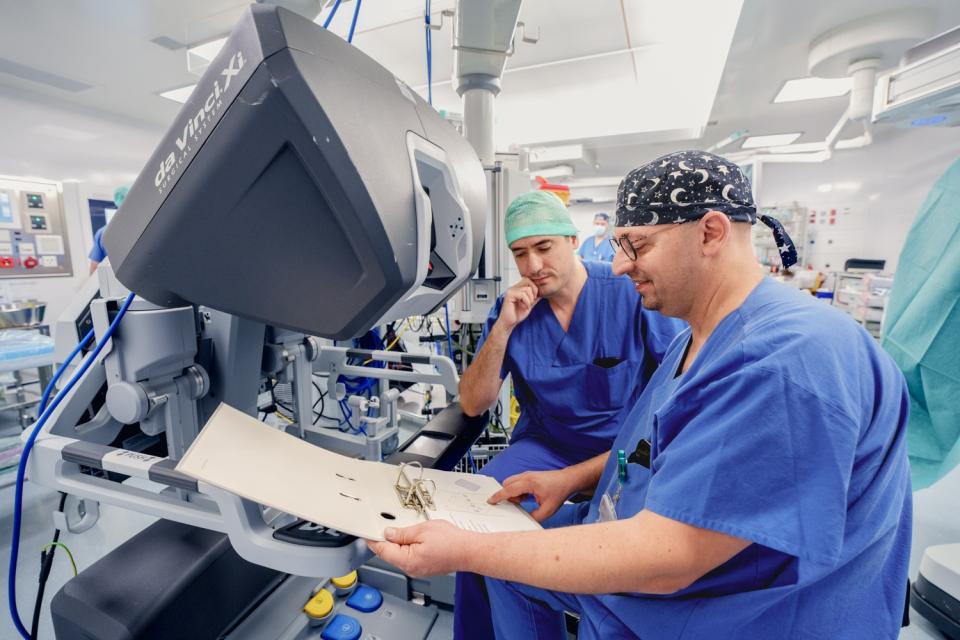Rectal cancer is of the adenocarcinoma
type and develops from a polyps
that has become cancerous, as in colon cancer.
The main risk factors for rectal cancer are ageing, positive family history of colon cancer, genetic factors (Lynch syndrome/HNPCC, familial adenomatous polyposis), chronic inflammatory bowel diseases, tobacco, alcohol, consumption of red meat and sedentary lifestyle.
Symptoms of rectal cancer
Manifestations of rectal cancer include abdominal pain, blood in the stool, a change of the intestinal transit (alternating diarrhea and constipation), urgency to defecate, intestinal obstruction
, intestinal perforation or, more insidiously, anemia. This cancer can also be detected in asymptomatic people during screening programs (FR).
Screening for rectal cancer should be performed from the age of 50 years
Currently, the recommendations stipulate that the majority of the population should be screened for rectal cancer from the age of 50 by colonoscopy. Screening can also be done by looking for occult blood in the stool or colo-scanner if access to colonoscopy
is difficult. If there is no lesion or polyp requiring closer follow-up, the colonoscopy should then be repeated every 10 years (and the test for occult blood in the stool every year in the absence of a colonoscopy).
People at high risk, i.e. those with one or more first-degree relatives with a positive familial history of colon cancer, should start screening at age 40 and repeat it every 5 years..
Diagnosis of rectal cancer
In case of rectal cancer, the workup includes a complete colonoscopy (if not yet performed), a rigid proctoscopy
, a CT scan of the abdomen, pelvis and thorax and a pelvic MRI or endo-anal ultrasound (carried out by the rectal route). Blood tests are also taken. Sometimes, a PET scan may be necessary. The patient's situation is then discussed during a multidisciplinary meeting named tumor board
.
INFO + Medical examinations in the radiology division (FR)
Management of rectal cancer depends on its location and on its stage
Depending on the stage of the cancer, an endoscopic resection (endoscopy
) of the cancerous polyp (transanal ablation: TEM or TAMIS) or ablation surgery to remove a part of or the entire rectum (low anterior resection) are carried out. If the tumor is locally advanced, the surgical intervention is preceded by radiotherapy, with or without chemotherapy.
If the tumor is located in the upper third of the rectum, the mesorectum (tissue surrounding the rectum) is removed in part, and entirely in the other cases (tumor of the middle third and lower third of the rectum). If necessary, this resection is accompanied by an abdominoperineal amputation which designates the partial or total ablation of the sphincter apparatus. The creation of a temporary or permanent ostomy
, as well as a reconstruction of the perineum (in the event of abdominoperineal amputation) may be necessary.
The surgical procedure is performed by laparotomy
, laparoscopy
or robotic surgery. Depending on the analysis of the tumor, radiotherapy or chemotherapy may be proposed after the operation. In some rare selected cases , when the tumor has disappeared after the pre-operative treatment (complete response), preservation of the rectum (treatment without surgery) may be considered.
INFO + Colorectal surgery: answers to your questions (FR)
Common cancerous tumor that develops from cells in a glandular lining or from the gland itself
Visual exploration of the gastro-intestinal tract, carried out using a probe fitted with a camera inserted into the rectum, used to highlight lesions of the inner lining of the colon
Examination of the inside of the rectum and the anal canal using a rigid tube
A meeting between specialists from several disciplines related to cancer, to determine the best possible treatment for each patient.
INFO + The Digestive Cancers Program
Method to visualize the internal organs and cavities for diagnostic or therapeutic purposes, carried out using an endoscope, a tube to which the end is attached to a lamp and a camera
The surgical connection of a segment of the digestive tract to the skin outside its natural location.
INFO + Ostomy
Open surgery of the abdomen
A surgical technique using small incisions and insertion of a camera


